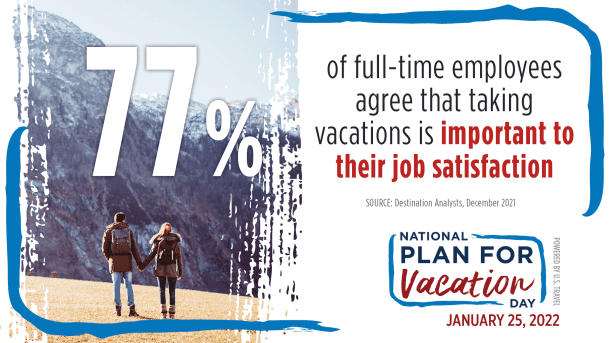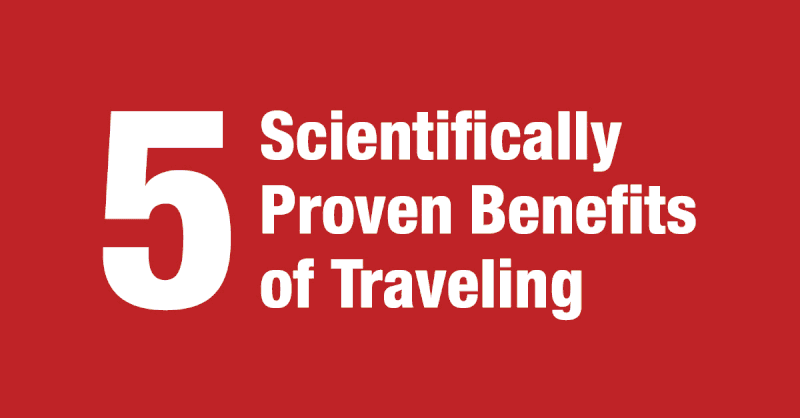How Travel Makes You Better at Work and Tips for Recharging on Vacation

You’ve probably heard the numbers on Americans’ vacation habits. They’re not pretty.
Last year, according to Expedia’s Vacation Deprivation study, Americans took only 11.5 vacation days on average. As the study pointed out, Americans “not only used the least vacation days but also received the least vacation days and had one of the highest percentages of people leaving the year with vacation days unused.”
In addition, the Expedia study found that almost 60% of Americans say they feel vacation-deprived, and nearly three-quarters say they feel burned out at work.
In the never-ending quest to work harder (or at least work more days) than the rest of the world, Americans have overlooked a very important fact: People do better at work if they take more vacations from work.
There’s a large body of research – not just from Expedia but from academic sources – supporting these findings.
Celebrate National Plan for Vacation Day by Using All Your Vacation Time
For instance, a study conducted in Germany, where people have and take many more vacation days, found that, “One single short vacation of four nights has positive effects on the well-being, recovery, strain, and perceived stress of middle managers, independent of the mode of vacation.”
Then there’s the study from Destinations Analysts that found that 8 out of every 10 employees feel vacations are important to their job satisfaction, and the one from Capital One that found more than half of business owners don’t take vacations.
We’re not getting away from it all, and when we do, too often it’s a “workcation,” where the laptop comes along and the Zoom venue changes from the basement to the hotel room.
What’s the answer? Taking a real vacation every now and then, obviously, but it’s more complicated than that.
Also read: Spring into Travel and Reconnect with the World Around You
Before we can feel comfortable just packing up and heading out, we have to take some transitional steps that validate our need to recharge while also validating our need to be seen as a productive employee.
How do we do that? Here are some tips:
Work for an organization with a “recharge” mindset
To the extent that you can control who you work for, and under what terms, it’s ideal to seek out firms committed to their employees’ overall well-being, including their attitude towards paid time off.
An organization that actively encourages its employees to maximize their PTO use with no strings attached is showing its dedication to its employees’ need to recharge and rejuvenate.
There is all kinds of research supporting the connection between vacations and positive mental-health outcomes. With mental health becoming a focus of concern in so many ways, there may never be a better time to focus on that yourself.
Also read: Travel and Our Health -- The Surprising Connection
Block off the time
Even if you don’t know where you’re going to go or what you’re going to do, block off at least a solid week of vacation on your calendar, and commit to that time.
Get support
If you’re having trouble breaking the cycle of work, get support from someone who doesn’t have that problem.
Ask them their mechanisms for ensuring work-vacation balance. Ask them where they go, how they flip the switch – whatever’s useful for you to know and emulate. And then once you’ve gleaned that answer, go and emulate. Maybe even take a vacation with them so their habits rub off on you.
Also read: Why Travel is so Important for Families, Especially Kids
Video: Why You Should Disconnect from Work on Vacation
Fight the workcation urge
If your phone is always on and your work laptop goes with you, how much of a vacation is it really?
Your vacation is your time to unplug. Make sure your superiors and co-workers know that and then you need to follow through and make it happen.
Don’t check work email. Don’t accept meetings. Don’t work on presentations or run the numbers. Don’t do any of it. This might be the hardest thing you have to do in conjunction with your vacation, and it may require baby steps to get you there.
For instance, if you absolutely, positively believe that the work world will come crashing down if you don’t rifle your inbox, block off time on your calendar to check email – no more than 45 minutes a day – and stick to it. If you’re on a longer vacation, see if you can taper off to 10 minutes by the end of your time away.
Workcations have their benefits, but they can also be a trap. And the best way to avoid a trap is to not walk that direction in the first place.
If your trip happens to be a work trip and not really a vacation, read our advice on How to Weave Wellness Travel into Any Trip.
Need inspiration for your next trip? Seven Unusual Ways to Discover New Places to Travel
Vacation time is vital for our well-being. Because of that, it’s important not to jeopardize that precious time, but to help protect it with travel insurance from Generali. Our plans give you the peace of mind you need to recharge fully. And getting a quote is easy.
Travel Resources
See AllB000122206




